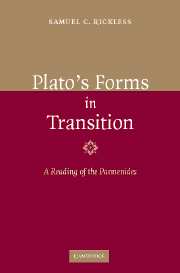Book contents
- Frontmatter
- Contents
- Preface
- List of abbreviations
- Introduction
- Chapter 1 The theory of forms
- Chapter 2 The theory criticized
- Chapter 3 The theory modified: methodology
- Chapter 4 The First Deduction
- Chapter 5 The Second Deduction
- Chapter 6 From the Appendix to the Fourth Deduction
- Chapter 7 From the Fifth to the Eighth Deduction
- Conclusion
- References
- Index of forms discussed
- Index of Deductions
- Index of passages cited
- General index
Chapter 2 - The theory criticized
Published online by Cambridge University Press: 22 September 2009
- Frontmatter
- Contents
- Preface
- List of abbreviations
- Introduction
- Chapter 1 The theory of forms
- Chapter 2 The theory criticized
- Chapter 3 The theory modified: methodology
- Chapter 4 The First Deduction
- Chapter 5 The Second Deduction
- Chapter 6 From the Appendix to the Fourth Deduction
- Chapter 7 From the Fifth to the Eighth Deduction
- Conclusion
- References
- Index of forms discussed
- Index of Deductions
- Index of passages cited
- General index
Summary
In the speech in which he challenged all and sundry to falsify the higher theory of forms, Socrates (so we are told) “kept from moment to moment expecting Parmenides and Zeno to get annoyed” (130a3–5). But Socrates' expectations were not rewarded. Rather, Parmenides and Zeno “both paid close attention to Socrates and often glanced at each other and smiled, as though they admired him” (130a5–7). And at the conclusion of the speech, just before launching into his criticisms of the higher theory, Parmenides compliments Socrates on his “keenness for argument” (130b1).
Given the interpretation of the dialogue arrived at thus far, Socrates is right to worry about how Parmenides and Zeno will react to his brash challenge. Although he clearly respects his elders, Socrates does not show much in the way of deference to their philosophical views. Why, then, does Plato have Parmenides and Zeno exchange smiles and then have Parmenides express admiration for Socrates' logical acumen? The correct explanation, as I see it, is that the smiles being exchanged are knowing smiles, the smiles of men who can afford to listen patiently and indulgently to Socrates' goading remarks because they take themselves to understand things that Socrates does not yet see. What it is that they see that he doesn't is the subject of this chapter.
THE EXTENT OF THE FORMS
At first sight, Parmenides' first criticism of the higher theory of forms is that the result of combining theorem E and axiom Ⅱ has some untoward consequences.
Information
- Type
- Chapter
- Information
- Plato's Forms in TransitionA Reading of the Parmenides, pp. 53 - 94Publisher: Cambridge University PressPrint publication year: 2006
